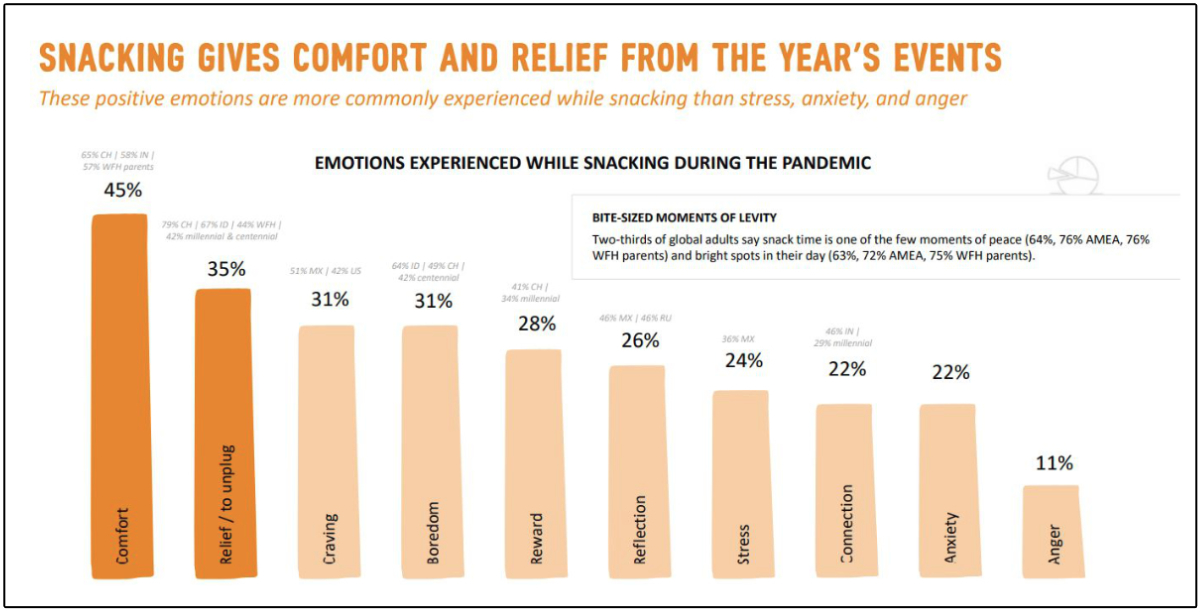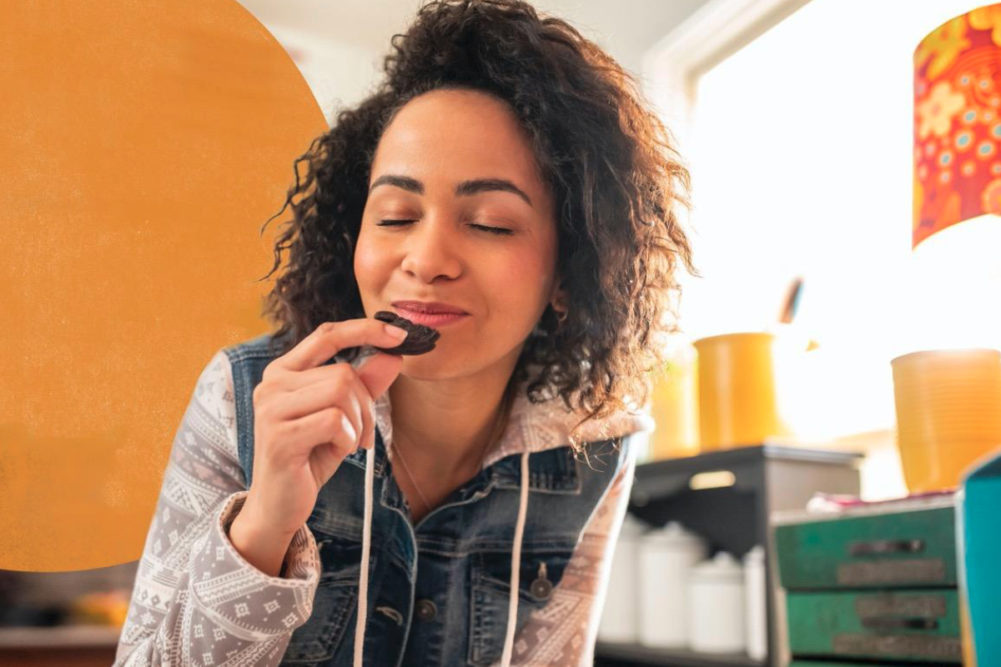CHICAGO — COVID-19 figured heavily into the findings from the second annual State of Snacking report released Nov. 11 by Chicago-based Mondelez International, Inc. Forty-six percent of respondents said they were snacking more during the pandemic than before it, which compared with 42% who said the same and 12% who said less. Fifty-two percent said snacking has been a “lifeline” during the pandemic.
Mondelez will take a new approach to reach those consumers. The company on Nov. 11 also announced a “humaning” global marketing strategy that emphasizes human connections. Mondelez gave examples of “humaning” as Oreo becoming involved in a #ProudParent platform, a Cadbury Dairy Milk campaign in the United Kingdom to tackle the crisis of elderly loneliness, and a Cocoa Life sustainable cocoa business model.
To create the State of Snacking report, The Harris Poll through an online survey contacted 6,292 adults age 18 and over in 12 global markets from Oct. 6-20 on behalf of Mondelez International.
The report found snacking is an antidote for loneliness as 77% said they connected with others via food in the past six months. Ways to connect included making a snack together at 40%, giving a snack as a gift at 31% or grocery shopping for someone who could not go themselves at 29%.
More people are mindful of snacking when they do so at home, according to the report. Sixty-six percent noted they have more control over portion sizes at home. Immunity-boosting snacks have become top of mind, according to 56%. Positives to eating snacks were a few moments of peace at 64% and bright spots in the day at 63%. The survey showed 53% said they had bought nostalgic snack brands that were popular during their childhoods.
When asked the emotions they experienced while snacking, the top two answers were comfort at 45% and relief/to unplug at 35%.
"As we empower people to snack right, we are proud of the role we play in the lives of consumers everywhere by delivering sources of comfort, connection and community that are difficult to find in this year of isolation."
— Dirk Van de Put, Mondelez International, Inc.
“Findings from our State of Snacking report reinforce the key role that snacking plays in the lives of global consumers, the growing importance of snacking during 2020 and the moments of peace it provides as individuals and families stay home and continue to face challenges brought on by the COVID-19 pandemic,” said Dirk Van de Put, chairman and chief executive officer of Mondelez International. “As we empower people to snack right, we are proud of the role we play in the lives of consumers everywhere by delivering sources of comfort, connection and community that are difficult to find in this year of isolation.”
Virtual snack shopping has increased as well: 47% said they have started to buy snacks online more often than they do in store or offline. While 77% said shopping for snacks online was easier than they thought it would be, 69% said they plan to keep shopping for snacks online once the pandemic is over.
Sub-categories more likely to say they preferred to eat small snacks during the day as opposed to a few large meals were millennials at 70%, people working from home during the pandemic at 67%, people in developing countries at 67% and people who make health a priority at 63%.
The trend of snacking at home could last as 58% said snacking will be part of the “new normal” after COVID-19 ends and 64% said they plan to continue eating small snacks throughout the day and have fewer large meals.
Creating human connections
Mondelez International explained its new “humaning” marketing strategy as no longer marketing to consumers but creating connections with humans.
“We intend to apply the ‘humaning’ approach to all that we do at Mondelēz International, both internally and externally,” said Martin Renaud, global chief marketing officer for Mondelēz International. “Snacking is all about forming connections with other people over the snacks we enjoy. People are craving connection and a human experience from brands, particularly in what has proven to be an incredibly unusual year. We want to make brands, campaigns, initiatives and a culture of ‘humaning’ that truly connects with consumers as people and genuinely has an impact on the world around us.”
“Humaning” happens when storytelling becomes story-doing, according to Mondelez, which gave Oreo, Cadbury Dairy Milk and Cocoa Life as examples.

Oreo has partnered with PFLAG, an organization for lesbian, gay, bisexual, transgender and queer (LGBTQ+) people, to create a #ProudParent platform that seeks to make the world a more accepting, affirming and compassionate place where all families belong. The platform made its debut in June. Oreo and PFLAG in October released a film called “Proud Parent.” Oreo also released limited-edition #ProudParent Oreo Rainbow cookies to reward the acts of those allied with the LGBTQ+ community.
Cadbury Dairy Milk under a campaign called “Donate your words” removed words from chocolate bar packaging and donated 30p of each chocolate bar to Age UK, a charity based in the United Kingdom. Since the campaign began in 2019, Cadbury Dairy Milk has donated more than £530,000 ($730,000) and sold more than 1.1 million “Donate your words” chocolate bars. Cadbury Dairy Milk encouraged people to donate their words by reaching out to older people in their communities. An estimated 1 million people have done so.
Cocoa Life tackles the challenges that cocoa farmers face such as climate change, gender inequality, poverty and child labor.
Mondelez said its internal diversity and inclusion goals and initiatives reflects “humaning,” too. The company in 2021 will become a member of Unstereotype Alliance, a platform that seeks to eradicate harmful stereotypes in media and advertising content, and a member of the Free The Work initiative, a talent-discovery platform for advertisers to connect with underrepresented creators.




